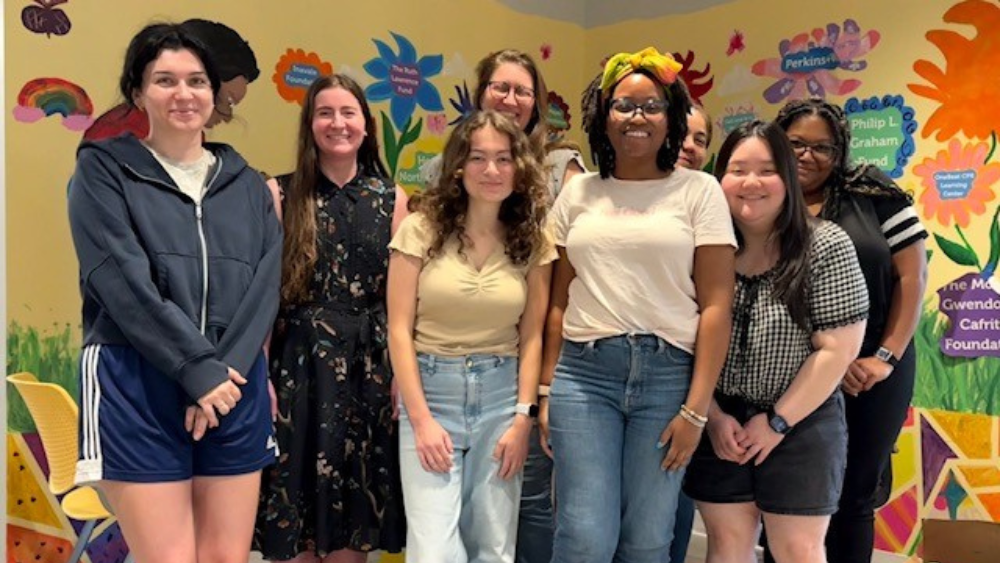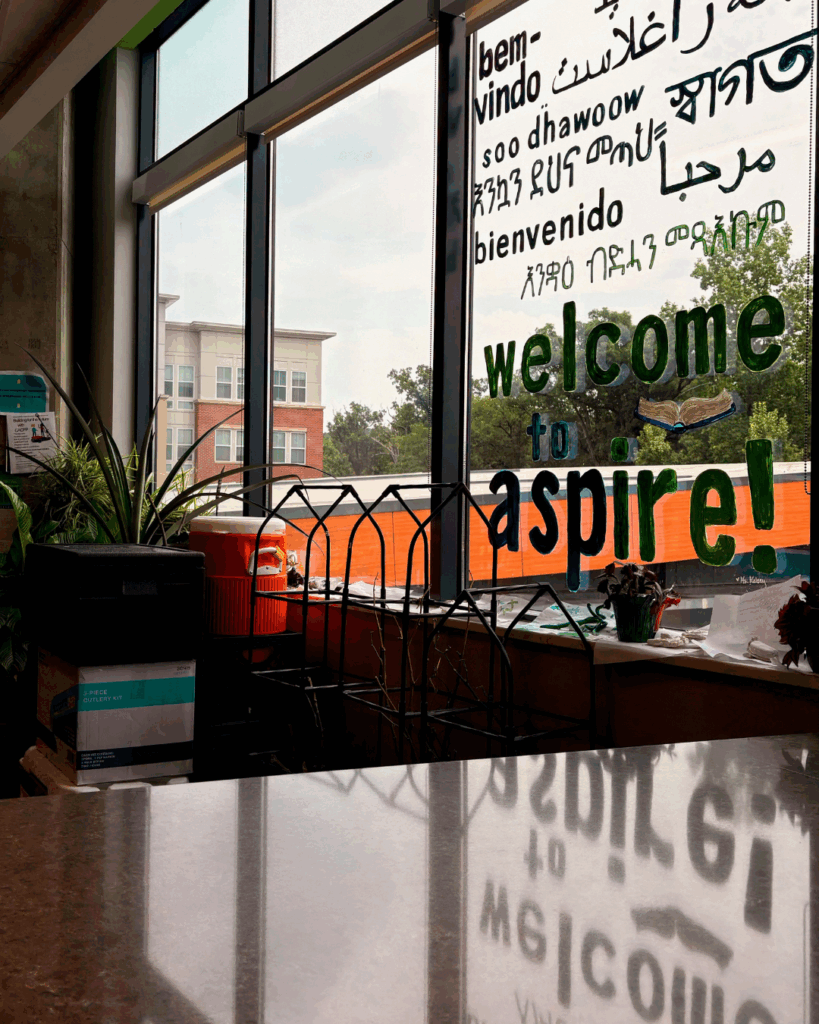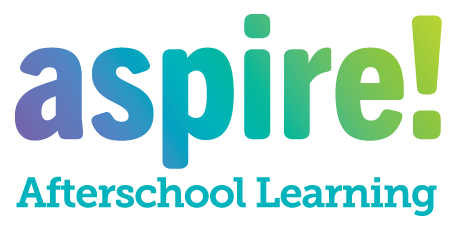My Summer Internship Experience: Developing Hope During Uncertain Times

Written by Sophie Nunziati, Development and Communications Intern
Throughout the past two and a half months, I have served as the Development and Communications intern at Aspire, as part of the Smith College Jean Picker Semester-in-Washington Program. Previously, I interned at two nonprofits in the education policy field. My work included contributing to parent-led advocacy efforts and co-creating a cell phone policy implementation guide. At Smith, I am majoring in Government and concentrating in Community Engagement and Social Change. Through my studies, I have gained an understanding of the policy formulation process and theories of change. Coming into this internship, I wanted to complement my studies with an understanding of how to put policy into practice. Aspire appealed to me because I could gain firsthand knowledge about how a small nonprofit provides learning support to positively impact students’ lives. I am very grateful to have learned from and contributed to Aspire’s after-school programming to help close the opportunity gap.
My first conversation with my mentor, Maggie McCoy, occurred on April 28th, the day when Aspire learned about the cuts to its AmeriCorps funding. Contrary to my expectations, I entered an office full of joy. The team was committed to moving forward despite the inherent threats to programming. Despite my sadness about cuts to Aspire’s funding, I, too, would become empowered through the work that I got to do. Not only did I gain practice in drafting and editing grants, researching additional funding opportunities, and crafting communications for a variety of audiences, but I also felt that I was contributing to Aspire’s efforts to support students in South Arlington.
Learning about Grant Writing
Adapting to funding cuts
Aspire has shifted its focus to adapt to AmeriCorps funding cuts. Now, it aims to sustain its programs and serve as many students as possible. When drafting my first grant, I gained a deeper understanding of Aspire’s strategy for filling the budget gap from AmeriCorps cuts. Where the previous year’s grant requested funding for “continuing growth”, I changed the language to ask for funds to “sustain work,” because the budget gap could impact enrollment numbers for the 2025-26 school year. I also emphasized Aspire’s impact, such as doubling the number of students reading on or above grade level. Through this narrative, I illustrated why this funding was integral for continuing Aspire’s programming, which serves students residing in the Columbia Pike Corridor.
Learning about the Columbia Pike Corridor
As a Chicagoan, I was unfamiliar with Columbia Pike. A few weeks into my internship, I drafted language on the community needs that Aspire’s new Makerspace will address. As part of this assignment, I conducted research on the digital divide in Arlington County, reading through the County’s Broadband Resource Evaluation and Strategic Recommendations. In this section, I highlighted the key information I found for funders. For example, I focused the narrative around a statistic: approximately 16.4 percent of households earning less than $75,000 do not have a home internet subscription. Then, I underscored how the individualized support that Aspire provides positions it to teach digital literacy to its students, who are more likely to be impacted by the divide in access to home internet services. I learned about specific areas of need, connected those areas to what Aspire offers, and adapted my writing for funders. This project gave me a comprehensive understanding of the demographics and unmet need in the Columbia Pike Corridor.

Lessons in Action
Writing newsletters
In addition to practicing writing grants, I gained a firsthand understanding of Aspire’s summer programs. From reading through the annual report and previous grant applications, I came to understand that Aspire’s program staff aims to provide students with a culturally relevant curriculum that encourages deeper learning. This was especially evident in daily lessons, in which students expanded their literacy, STEM, social-emotional skills, and more. In one lesson, designed by program team member Celia Chadwick, students researched water deities from their own cultures. They practiced their online research skills to learn about deities such as Varuna, the Hindu god of water, and Oshun, the Yoruba goddess of love and freshwater. After conducting research, students honed their creativity to design the characteristics of their deity.
I actively sought out the opportunity to collaborate with Maggie on two newsletters. I focused on writing summaries of lesson plans and activities. After I submitted my first draft, I received feedback from Maggie, advising me to simplify my writing. As a college student who is used to writing in an academic style, I found it challenging to adapt my writing to a more casual and direct format. In the process, I learned that asking for continuous feedback allowed me to effectively refine my writing style for an audience of community supporters.
Additionally, I learned to prioritize readability and focus on conveying key information. For example, my draft summary of a lesson on myth creation included a description of the steps students took to prepare for and create their own myths, along with what they learned. Though these details might function well in a long-form blog post, they could be removed from the newsletter to focus on the crucial elements of the lesson (i.e., students used their storytelling skills to create their myths, and middle schoolers even wrote their own poems). As Maggie explained, this brief overview works well because it includes just enough details for the audience to quickly read the newsletter and understand what students are doing.
A view inside the classroom
One of the highlights of my internship experience was volunteering in Aspire classrooms. I volunteered in Class 1, where students were doing tie-dye, and Class 4, where students were designing wind cars. It was fun to observe how the kids thoughtfully engaged with their activities, be it experimenting with folding methods when doing tie dye or figuring out how to construct their wind cars. When walking around the classrooms, I saw the students being curious about how things worked and asking questions throughout. I also noticed how the kids persevere through these activities and actively ask for help when they are stuck.
Throughout this internship, I have developed a deep appreciation for Aspire’s mission to provide holistic and individualized learning support through after-school and summer programs.
Seeing these lessons in action has given me an appreciation for the methods that program staff use to enrich students’ learning. Especially during an era of federal funding cuts, I believe that sharing what Aspire does for students is key for ensuring that Aspire can continue to enrich students’ learning and close the opportunity gap.
I am grateful to have received a nuanced perspective of Aspire and its community. Because of this internship experience, I am leaving with a fuller understanding of Aspire and the Columbia Pike community–the people, the community partners, its needs, and most importantly, the next generation of kids growing up here.
